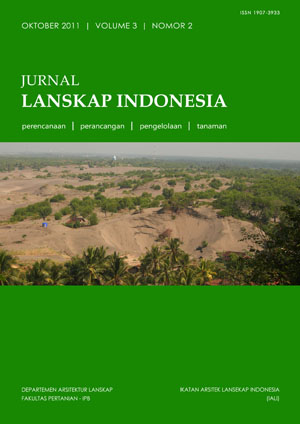PERANAN RISET DAN PENINGKATAN KETERAMPILAN ARSITEK LANSKAP DALAM MENGHADAPI PENERAPAN KONSEP GREEN BUILDING
Abstract
Implementation of Green building concept is expected to promote the progress of industrial property and the role of the experts whose involved in the process, including Landscape Architects. Instead benchmark valuation increasing over time, with the current version of the assessment in Indonesia, the role of landscape design can contribute up to 12% of the total value. Criteria that require the involvement of Landscape Architects primarily related to the basic green areas poin, site landscaping poin, and water efficient landscaping poin. Poin and the benchmark is still potential to increase along with the relevance rating systemically so that will indirectly addvalue to other criteria such as energy and overalls Thermal Transfer Value (OTTV). This is not related, but not directly with developing standards in landscape design. The development of this standard requires further research, such as Indonesian
regional plant data, technologies and methods of irrigation, landscape maintenance techniques, and the reconciliation of the standardization of regulations which spread as the various standards that are adopted from another country. By increasing the quality and quantity of research in the field of landscape architecture and landscape plants, is expected to improve the quality of green building practices toward higher standards
and still have its own characteristics of Indonesia.
Downloads
This journal permits and encourages authors to post items submitted to the journal on personal websites or institutional repositories both prior to and after publication, while providing bibliographic details that credit, if applicable, its publication in this journal. However, after the article is submitted and published in this journal, it is fully copyrighted by the Jurnal Lanskap Indonesia or JLI. If excerpts from other copyrighted works are included, the author must obtain written permission from the copyright owner and give credit to the source in the article. Then, the writer or reader is allowed to copy, share, and redistribute articles/material in any form. But it must still include the appropriate source and credit because the article in this journal is licensed by Creative Commons Attribution 4.0 International License (CC BY 4.0).
I. Proposed Policy for Journals That Offer Open Access
Authors who publish with this journal agree to the following terms:
- Authors retain copyright and grant the journal right of first publication with the work simultaneously licensed under a Creative Commons Attribution License that allows others to share the work with an acknowledgement of the work's authorship and initial publication in this journal.
- Authors are able to enter into separate, additional contractual arrangements for the non-exclusive distribution of the journal's published version of the work (e.g., post it to an institutional repository or publish it in a book), with an acknowledgement of its initial publication in this journal.
- Authors are permitted and encouraged to post their work online (e.g., in institutional repositories or on their website) prior to and during the submission process, as it can lead to productive exchanges, as well as earlier and greater citation of published work (See The Effect of Open Access).
II. Proposed Policy for Journals That Offer Delayed Open Access
Authors who publish with this journal agree to the following terms:
- Authors retain copyright and grant the journal right of first publication, with the work after publication simultaneously licensed under a Creative Commons Attribution License that allows others to share the work with an acknowledgement of the work's authorship and initial publication in this journal.
- Authors are able to enter into separate, additional contractual arrangements for the non-exclusive distribution of the journal's published version of the work (e.g., post it to an institutional repository or publish it in a book), with an acknowledgement of its initial publication in this journal.
- Authors are permitted and encouraged to post their work online (e.g., in institutional repositories or on their website) prior to and during the submission process, as it can lead to productive exchanges, as well as earlier and greater citation of published work (See The Effect of Open Access).



























